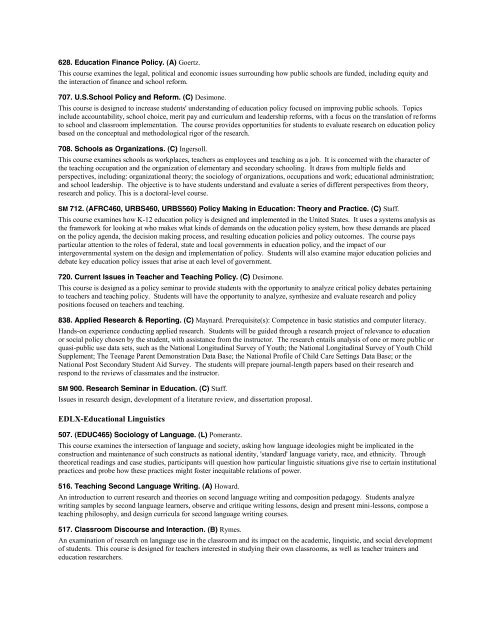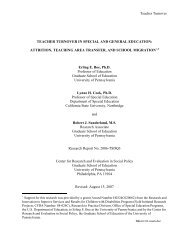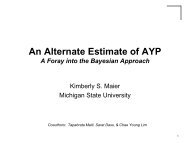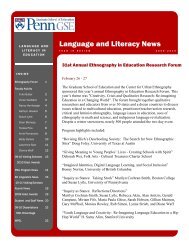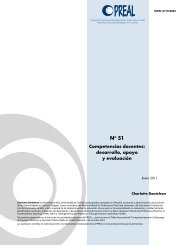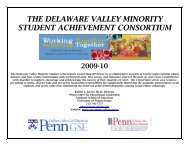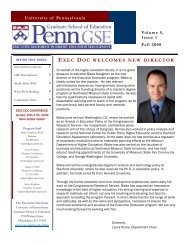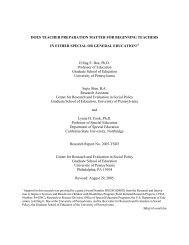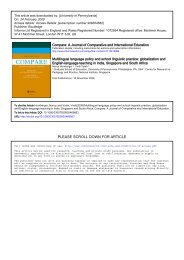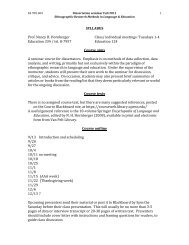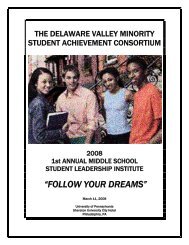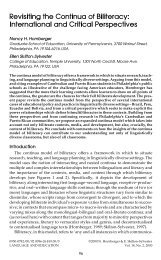EDUCATION (ED) {EDUC} - Penn GSE
EDUCATION (ED) {EDUC} - Penn GSE
EDUCATION (ED) {EDUC} - Penn GSE
Create successful ePaper yourself
Turn your PDF publications into a flip-book with our unique Google optimized e-Paper software.
628. Education Finance Policy. (A) Goertz.<br />
This course examines the legal, political and economic issues surrounding how public schools are funded, including equity and<br />
the interaction of finance and school reform.<br />
707. U.S.School Policy and Reform. (C) Desimone.<br />
This course is designed to increase students' understanding of education policy focused on improving public schools. Topics<br />
include accountability, school choice, merit pay and curriculum and leadership reforms, with a focus on the translation of reforms<br />
to school and classroom implementation. The course provides opportunities for students to evaluate research on education policy<br />
based on the conceptual and methodological rigor of the research.<br />
708. Schools as Organizations. (C) Ingersoll.<br />
This course examines schools as workplaces, teachers as employees and teaching as a job. It is concerned with the character of<br />
the teaching occupation and the organization of elementary and secondary schooling. It draws from multiple fields and<br />
perspectives, including: organizational theory;; the sociology of organizations, occupations and work;; educational administration;;<br />
and school leadership. The objective is to have students understand and evaluate a series of different perspectives from theory,<br />
research and policy. This is a doctoral-level course.<br />
SM 712. (AFRC460, URBS460, URBS560) Policy Making in Education: Theory and Practice. (C) Staff.<br />
This course examines how K-12 education policy is designed and implemented in the United States. It uses a systems analysis as<br />
the framework for looking at who makes what kinds of demands on the education policy system, how these demands are placed<br />
on the policy agenda, the decision making process, and resulting education policies and policy outcomes. The course pays<br />
particular attention to the roles of federal, state and local governments in education policy, and the impact of our<br />
intergovernmental system on the design and implementation of policy. Students will also examine major education policies and<br />
debate key education policy issues that arise at each level of government.<br />
720. Current Issues in Teacher and Teaching Policy. (C) Desimone.<br />
This course is designed as a policy seminar to provide students with the opportunity to analyze critical policy debates pertaining<br />
to teachers and teaching policy. Students will have the opportunity to analyze, synthesize and evaluate research and policy<br />
positions focused on teachers and teaching.<br />
838. Applied Research & Reporting. (C) Maynard. Prerequisite(s): Competence in basic statistics and computer literacy.<br />
Hands-on experience conducting applied research. Students will be guided through a research project of relevance to education<br />
or social policy chosen by the student, with assistance from the instructor. The research entails analysis of one or more public or<br />
quasi-public use data sets, such as the National Longitudinal Survey of Youth;; the National Longitudinal Survey of Youth Child<br />
Supplement;; The Teenage Parent Demonstration Data Base;; the National Profile of Child Care Settings Data Base;; or the<br />
National Post Secondary Student Aid Survey. The students will prepare journal-length papers based on their research and<br />
respond to the reviews of classmates and the instructor.<br />
SM 900. Research Seminar in Education. (C) Staff.<br />
Issues in research design, development of a literature review, and dissertation proposal.<br />
<strong>ED</strong>LX-Educational Linguistics<br />
507. (<strong>ED</strong>UC465) Sociology of Language. (L) Pomerantz.<br />
This course examines the intersection of language and society, asking how language ideologies might be implicated in the<br />
construction and maintenance of such constructs as national identity, 'standard' language variety, race, and ethnicity. Through<br />
theoretical readings and case studies, participants will question how particular linguistic situations give rise to certain institutional<br />
practices and probe how these practices might foster inequitable relations of power.<br />
516. Teaching Second Language Writing. (A) Howard.<br />
An introduction to current research and theories on second language writing and composition pedagogy. Students analyze<br />
writing samples by second language learners, observe and critique writing lessons, design and present mini-lessons, compose a<br />
teaching philosophy, and design curricula for second language writing courses.<br />
517. Classroom Discourse and Interaction. (B) Rymes.<br />
An examination of research on language use in the classroom and its impact on the academic, linquistic, and social development<br />
of students. This course is designed for teachers interested in studying their own classrooms, as well as teacher trainers and<br />
education researchers.


